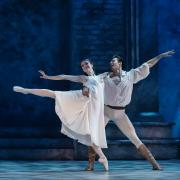Tony Greenway discovers the secrets of success with Mark Skipper, chief executive of the Leeds-based touring company.

Here's a well-worn question for you: is ballet an expensive and elitist art form? Well, no. Not if Leeds-based touring company Northern Ballet has anything to do with it.
Let's take that 'expensive' charge first. True, in some places, going to the ballet isn't a cheap night out. If you want to see a production at Covent Garden, for instance, you may have to first remortgage your house and/or sell one of your organs. But Northern Ballet does its best to keep its tickets affordable - and, because it's a touring company, will adjust its prices to reflect the economic perspective of the towns and cities it visits.
Then there's that 'elitist' tag. Again, no, says Mark Skipper, Northern Ballet's chief executive. If you programme your seasons thoughtfully, ballet has the power to amaze and delight every age group and both sexes. 'You do have to keep refreshing the ballet audience, which tends to be female and slightly middle-aged and older,' he admits. 'So part of our programming is about doing things that attract OTHER audiences.
Take Dracula. Performed at Leeds Playhouse, it streamed live to cinemas across the UK on Halloween. This will be followed up with a family show: Cinderella, which runs at the Leeds Grand Theatre from December until January.

In spring of next year prepare for the world premiere of Geisha, which promises (like Dracula) to be more adventurous and experimental. There'll also be an autumn production of The Great Gatsby and, for the 2020 Yuletide season, the family-friendly Merlin. There are 40-minute children's ballets, too, specifically performed to attract the attention of much younger audiences (and which are adapted for broadcast on CBeebies).
'We've ALWAYS had the ethos of telling stories that weren't just 'traditional' ballet titles,' says Skipper.
Basically, Northern Ballet likes to think outside the box, which might be why the company has lasted so long. 50 years to be exact.
The company was founded by Canadian-born Laverne Meyer and performed its first production in Manchester in 1969. Northern Ballet stayed in Manchester until 1990, then moved across to Halifax. In 1996 it upped sticks again at the invitation of Leeds City Council, setting up home in the old West Park Centre before finally settling in a shiny new building on Quarry Hill in 2010.

'The council is one of the most supportive local authorities for arts and culture,' he says. 'And Leeds is unique - although others may try to disprove it - because we're the only major city in the country, other than London, with its own ballet company, opera company, contemporary dance company, Playhouse, and all the museums and galleries etc, etc. Manchester is often spoken about as a major cultural city, and, of course, it is. But it doesn't have a ballet or opera company, so as far as I'm concerned 'Leeds is the place to be for culture. We're totally embedded here.'
Over his 32 years with the company, there have been some bleaker moments, says Skipper. For instance, he remembers the fire that broke out during the company's time in West Park which destroyed a whole chunk of the building; and the Boxing Day flood in 2015 at a storage facility at Stourton in Leeds, which caused damage to sets and costumes to the tune of £2 million. 'Those were the low points, but I can always turn these things into a positive and fortunately everything was well-insured, which enabled us to recreate (sets and costumes) which were lost.'
When it comes to high points, one was joining the company as deputy stage manager in 1987 and finding himself working with one of his heroes: Gillian Lynne, the award-winning choreographer of Cats and Phantom of the Opera. ('She sadly passed away last year, but became a great friend for 30 years.').
Moving into the Quarry Hill building was another memorable period. 'And also I think back to the days in Halifax when times were hard for the company,' he says. 'It was under threat financially, but the board took a decision to spend a lot of money creating a production of Romeo and Juliet which was directed by the late artistic director Christoper Gable, and choreographed by Massimo Morricone. It was a huge risk to invest a lot of money in that production, but it proved hugely successful and turned the company around at a difficult time.'
Like Gable, Northern Ballet's current artistic director, David Nixon, is a class act, says Skipper. 'David is just a brilliantly creative person and we work well together. I guess we have the same taste in terms of the types of stories that we want to tell.'
On January 4, a gala at The Grand Theatre will celebrate Northern Ballet's 50th birthday, revisiting much-loved productions. 'We'll also be joined by guest artists from other major companies,' says Skipper, reeling off names such as The Royal Ballet, American Ballet Theatre, English National Ballet, Scottish Ballet, Birmingham Royal Ballet and Phoenix Dance Theatre. 'Normally during a gala event of this kind, guest artists will dance Swan Lake, or the Nutcracker, etc. But we're having them learn excerpts from our productions, which makes it a little bit different.'
Whatever way you look at it, turning 50 is a milestone moment. 'It's hugely exciting for any company to reach this point,' agrees Skipper. 'But, you know, we can never take things for granted. We rely on a significant amount of funding from the government via the Arts Council, and we're in the second of a four-year funding round. We don't know what's going to happen with the current political situation and we've been on standstill funding for the last five years - and that will continue for the next two years. It's becoming more and more difficult to sustain the level of touring, creating new work, maintenance of a full orchestra, etc. Also, the market place for leisure time is becoming more crowded. So we have to continue to compete and remain valid in terms of what we offer. We can't become complacent.'





























